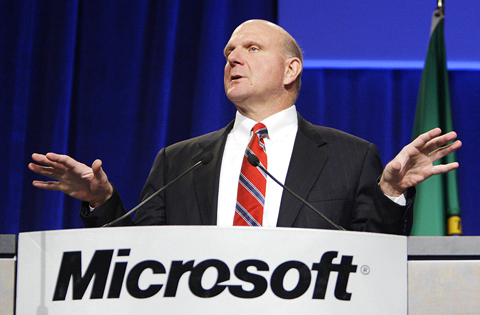Not everyone is slashing jobs in these grim economic times. Microsoft Corp has no plans to cut back on research spending and plans to add workers in the coming year, senior executive Craig Mundie said on Friday.
“Right now we’re still on a plan to complete 100 percent of our college recruitment plan globally,” he told reporters.
“The ability to get top talent has actually improved” as the world enters what could be a punishing recession.

PHOTO: AP
Nor is Microsoft, which has 90,000 employees and more than US$20 billion in cash on hand, decreasing its global budget for educational programs — which affects 100 countries, said Mundie, the software giant’s chief research and strategy officer.
Mundie said in an interview during a 21-nation Pacific Rim economic summit that top management decided a few weeks ago it would slow hiring. But he said its US$8 billion research budget wouldn’t be trimmed.
“Our position at this point is that we hope to continue to actually still have some growth in our employment through the course of the year. But we’re monitoring the situation carefully,” he said.
Mundie said he believed Microsoft could actually benefit from the global downturn as people decide to hold meetings online rather than get on airplanes — or save on phone costs by relying more on voice-over-Internet technology.
“I think we might see some movement toward those things that have an almost immediate payback in terms of productivity or cost containment,” he said.
Separately, Yahoo has sold European comparison shopping service Kelkoo to a British investment firm, Kelkoo founder and former chief executive Pierre Chappaz said on Friday.
The sale comes as Yahoo searches for a new chief executive to replace Jerry Yang (楊致遠), the Yahoo co-founder who announced this week that he would be stepping down after less than 18 months.
Earlier this year, Yang rejected a US$47 billion takeover offer from software giant Microsoft, earning the ire of many shareholders.
Chappaz, in a posting on his blog, published a memo to Kelkoo employees from a Yahoo Europe executive, Glen Drury, announcing the sale of Kelkoo to British private equity firm Jamplant Ltd.
“Philip Smyth, chairman of Jamplant, believes that with our backing, Kelkoo should be able to accelerate its growth much faster as a standalone company,” the memo from Drury said.
Chappaz, who founded Kelkoo in 1999 but has since left, said Kelkoo was sold for under 100 million euros (US$125 million), significantly less than the 475 million Euros paid by Yahoo for the firm in 2004.
In his blog posting, Chappaz delivered a parting shot at Yahoo saying “the difference is the price of management incompetence that led Yahoo’s share price under nine dollars.”

Quanta Computer Inc (廣達) chairman Barry Lam (林百里) is expected to share his views about the artificial intelligence (AI) industry’s prospects during his speech at the company’s 37th anniversary ceremony, as AI servers have become a new growth engine for the equipment manufacturing service provider. Lam’s speech is much anticipated, as Quanta has risen as one of the world’s major AI server suppliers. The company reported a 30 percent year-on-year growth in consolidated revenue to NT$1.41 trillion (US$43.35 billion) last year, thanks to fast-growing demand for servers, especially those with AI capabilities. The company told investors in November last year that

Intel Corp has named Tasha Chuang (莊蓓瑜) to lead Intel Taiwan in a bid to reinforce relations between the company and its Taiwanese partners. The appointment of Chuang as general manager for Intel Taiwan takes effect on Thursday, the firm said in a statement yesterday. Chuang is to lead her team in Taiwan to pursue product development and sales growth in an effort to reinforce the company’s ties with its partners and clients, Intel said. Chuang was previously in charge of managing Intel’s ties with leading Taiwanese PC brand Asustek Computer Inc (華碩), which included helping Asustek strengthen its global businesses, the company

Taiwanese suppliers to Taiwan Semiconductor Manufacturing Co. (TSMC, 台積電) are expected to follow the contract chipmaker’s step to invest in the US, but their relocation may be seven to eight years away, Minister of Economic Affairs J.W. Kuo (郭智輝) said yesterday. When asked by opposition Chinese Nationalist Party (KMT) Legislator Niu Hsu-ting (牛煦庭) in the legislature about growing concerns that TSMC’s huge investments in the US will prompt its suppliers to follow suit, Kuo said based on the chipmaker’s current limited production volume, it is unlikely to lead its supply chain to go there for now. “Unless TSMC completes its planned six

TikTok abounds with viral videos accusing prestigious brands of secretly manufacturing luxury goods in China so they can be sold at cut prices. However, while these “revelations” are spurious, behind them lurks a well-oiled machine for selling counterfeit goods that is making the most of the confusion surrounding trade tariffs. Chinese content creators who portray themselves as workers or subcontractors in the luxury goods business claim that Beijing has lifted confidentiality clauses on local subcontractors as a way to respond to the huge hike in customs duties imposed on China by US President Donald Trump. They say this Chinese decision, of which Agence